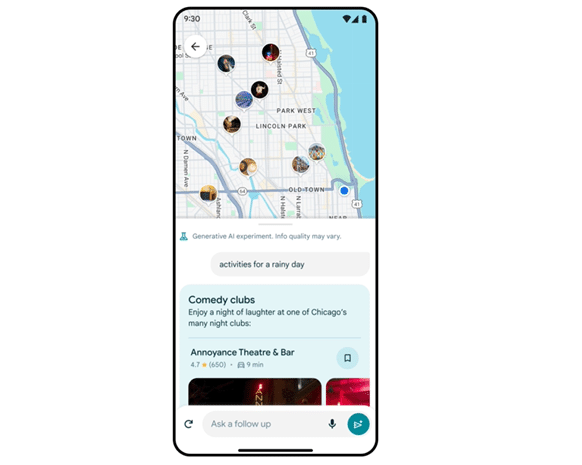As technology continues to transform daily life, AI-powered search tools are reshaping how we discover new places and plan trips. By tailoring recommendations and generating insights in real-time, these AI tools support travellers in making more informed decisions.
AI in Google Maps Integration
Recently, Google announced new Google Maps update of its Gemini AI integration into Google Maps. Initially available to U.S. users, this AI enhancement will allow people to discover new attractions and gain valuable insights shared by other users. Additionally, one of the new Google Maps features will generate suggestions for attractions and restaurants based on user queries and specific criteria each location should meet.
In terms of navigation, Google Maps will soon include visual aids for lane changes, along with information about restaurants, attractions, and parking along the route. Compared to previous updates, this enhancement promises to significantly improve user experience by providing highly accurate and detailed information about various destinations, including details like live music or local events.

To prevent potential issues with AI hallucinations—where AI tools produce biased or inaccurate responses, such as adding glue as an ingredient in a pizza recipe—Google will combine AI-generated data with real-world information collected directly from its services.
In addition to Google Maps, AI will be integrated into other tools like Google Earth, which will aid developers and urban planners, and Waze, allowing users to report traffic events by voice.
AI in Google Maps: What Do These Changes Mean?
From the user’s perspective, this development enhances the travel experience in several ways. Overall, one of AI’s biggest advantages is its ability to process vast amounts of data to deliver the best solutions, enabling personalized information for each user.
Thus, personalization shortens the planning and preparation process by identifying not only the route itself but also determining which places along the way are worth visiting and what dining establishments are located on that route. All of these options can be selected and tailored to the user’s needs, as mentioned, by simply providing recommendations based on the user’s specific query.
Second, virtual assistants offer real-time support by providing information about flights, hotels, and more, reducing the time and effort required by travellers.
What Do Users Think About AI in Google Maps?
On the social platform Reddit, users are evaluating and discussing this recent maps and location progress by Google. There are diverse opinions—some users feel that this is nothing new, as similar features already exist in various formats across different products. Others express doubts about the quality and reliability of such tools. Nonetheless, there remains a significant portion of positive opinions from those who believe in the integration of these features into Google products and trust the AI-generated insights provided.
Final Word
Google seems poised to add dynamic functionality and efficiency to the travel planning process, reducing the time and effort required. Despite concerns around AI hallucinations, the application of generative AI in Google Maps opens the door to advancements, enabling users to plan a personalized trip almost instantly. This saves travellers time and ensures a better user experience.
If you are interested in this topic, we suggest you check our articles:
- Beyond Bard: The Power of Google Gemini
- Generative AI: Deep Dive on What It Is and How it Can Be Used
- Avoiding LLM’s “hallucinations” could now be possible
Sources: TechCrunch, TechTarget, The Verge, Reddit, Reuters, Mize
